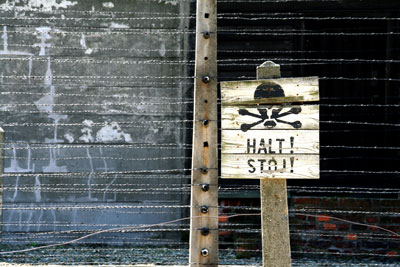At first glance, Auschwitz is not what you expect. You’re so used to seeing those chilling, horrific, black and white images of the camp, it’s almost a surprise when everything doesn’t shift to bleak monochrome the moment you arrive. Instead, it actually looks quite beguiling, Butlins dressed up in barbed wire. The sky is a brilliant blue, silver birches line the avenues between the red-brick barracks, and it’s flooded by camera-happy travelers in brightly-coloured clothing. It’s almost impossible to reconcile what happened here with present-day reality when the site is so dominated by coach-trip tourism: at lunch I overhear a British guest uttering the familiar, ‘we must never let this happen again’ line, before moving on and complaining about the coffee she’d just been served, all without missing a beat.

It’s only inside the barracks that you really get a flavour of the Nazi brutality – the vast cabinets full of human hair and empty suitcases and discarded children’s shoes; or the grim pictures of emaciated twins, victims of Mengele’s grotesque experiments in human fertility; or the corridor lined with thousands of individual portraits of prisoners, each given two dates: deportation, death.

After lunch we’re driven a couple of kilometres to Birkenau, where the Nazis ramped up the killing as the Allies drew closer. I talk to our guide, a nice Polish lady with a soft, sad face, who tells me she’s been showing tourists round the camp for seventeen years. Originally she found working at Auschwitz hard to cope with, and now forces herself to stop thinking about the dayjob when going home to her children. It’s not that she’s become inured to what happened here, but it does probably explain why she delivers the appalling story with all the detached formality of an air-hostess revealing the location of the emergency exits. It’s the only way to cope.
if you want to relive your travels at home, there are two documentaries I saw last year that are worth your while. One is called KZ by Rex Bloomstein that confronts this idea of Holocaust tourism. It’s an interesting project. And for something a bit lighter, there’s a doc simply called Guca I think, about all the trumpet madness. I think someone else is setting a fictional story there for a new film.
ah, sorry to have missed you in berlin. was there last week.
how can you cope with that tour? with a lot of kittens?
Yes. Always the kittens.
My mother was brought up in world war 2 Austria,occultists have a word for speaking things into being a mekheru.That being, the more not opinion actual truth a person or being speaks the stronger the being’s ability to affect reality.If they were a bunch of citizens that were only trying to live their own lives not interfering with anyone elses, then I would lament for them.The austrian word na means let it be, Z is the omega of the greek alphabet as the God of apacolypse. Mass Groups of sedition can not be tolerated even in a free society .All I can say is when I was a boy I asked my mother the difference between someone of African descent and someone else and she told me as she had learned in school and from her mother,”they have feelings just like anyone else” and I was taught to respect people even if they were Jews.